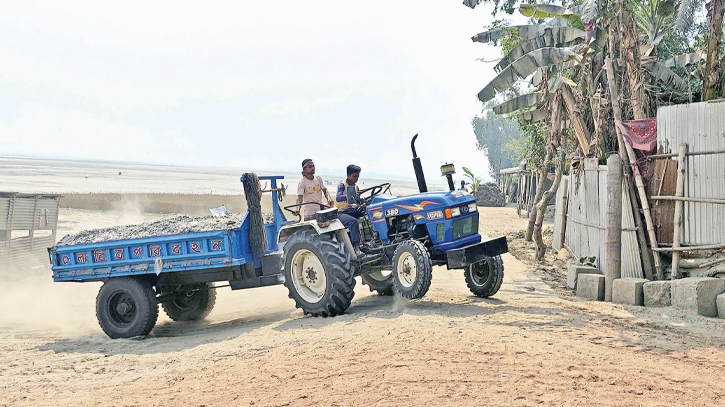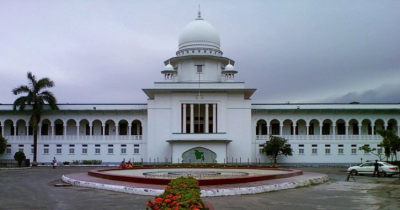
Photo: Messenger
Illegal sand mining operations are rampant along the banks of the Brahmaputra River, causing significant destruction to the char areas in Chilmari, Kurigram.
This illegal activity, driven by influential individuals, involves the extraction and sale of sand, leading to detrimental consequences such as untimely erosion and threats to the surrounding areas.
In Nandirmor and Jorgach Bazar areas of Ramna Union, the brazen sand business thrives, leading to untimely erosion and endangering the very communities that depend on the river's stability.
Despite the Brahmaputra river bank protection project being meant to safeguard against erosion and maintain the integrity of surrounding settlements, illegal sand mining persists unabated. Influential figures in the community, including Hafizur Rahman, Farooq Mia, Hamidul Islam, Lal Mia, and Tuhin, spearhead this illicit trade, profiting at the expense of environmental degradation and community welfare.
Residents living along the riverbanks witness their land's gradual disappearance as sand mining activities intensify. The once-thriving Jorgach Bazar, educational institutions, and residential areas now face an imminent threat of being engulfed by the river. Despite their pleas for intervention, the authorities seem either unwilling or unable to stem the tide of illegal sand extraction.
The consequences of this unchecked exploitation are dire. Apart from the loss of land and livelihoods, the continuous erosion exacerbates the risk of accidents and disruptions to essential services. The proximity of Jorgach Government Primary School to the bustling activity of sand mining poses a constant threat to the safety of students and teachers alike.
Attempts to address the issue have been met with resistance and intimidation from those involved in the sand trade. Even political figures like Md. Lal Mia, the General Secretary of Ramana Union Awami League, deny their involvement, further complicating efforts to hold perpetrators accountable.
Despite assurances from local authorities like Md. Nazmul Haque, the IC of Chilmari Port Naval-Fadi, and Md. Minhajul Islam, the Upazila Nirbahi Officer, concrete action remains elusive. While occasional crackdowns may temporarily halt sand mining activities in certain areas, the lack of sustained enforcement allows the cycle of exploitation to continue elsewhere.
The plight of the affected communities underscores the urgent need for coordinated action to address the root causes of illegal sand mining. Strengthening regulatory mechanisms, enhancing surveillance, and enforcing strict penalties for violators are essential steps in safeguarding the Brahmaputra river ecosystem and the livelihoods dependent on it.
Furthermore, fostering community participation and awareness can empower residents to resist exploitation and advocate for their rights effectively. By amplifying their voices and mobilizing support from civil society organizations and government agencies, grassroots movements can pressure authorities to prioritize the preservation of natural resources and the well-being of vulnerable communities.
In the face of rampant sand mining and encroaching erosion, the resilience of Chilmari's residents serves as a beacon of hope. Their determination to protect their homes and livelihoods from the ravages of exploitation is a testament to the enduring bond between communities and their natural environment. It is imperative that their calls for justice and sustainability are heard and heeded before irreversible damage is done to the fragile ecosystem of the Brahmaputra River.
Messenger/Fardin








